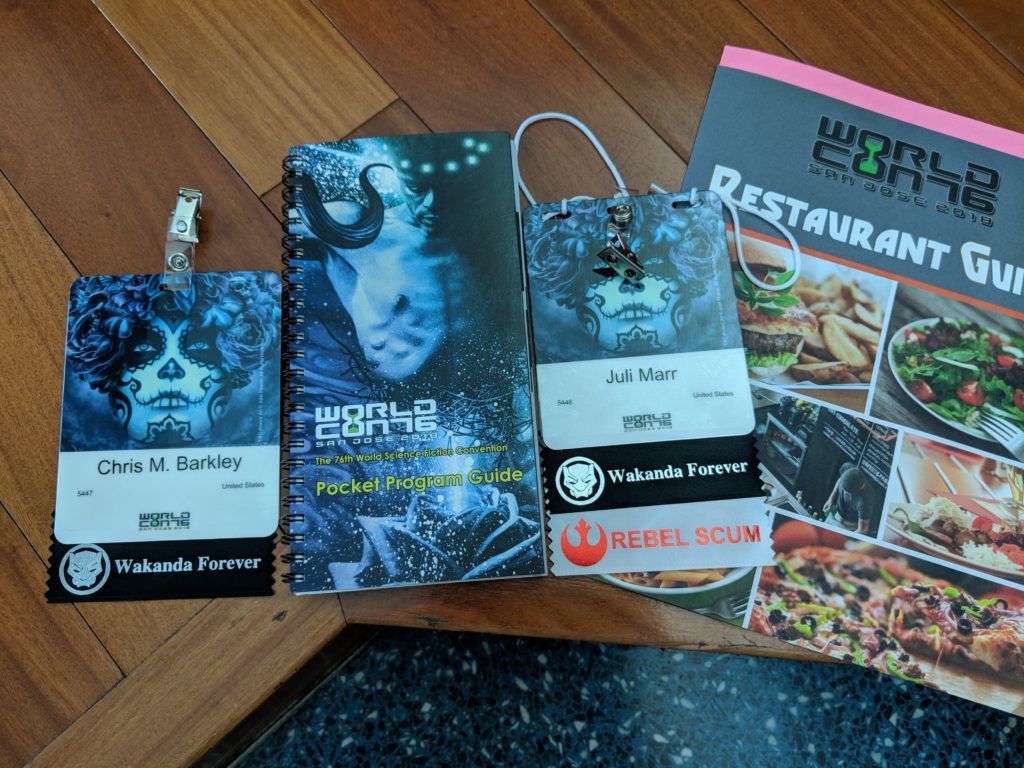 Mission Worldcon 76 – Fallout!
Mission Worldcon 76 – Fallout!
By Chris M. Barkley: First of all, I apologize for the lateness of this report. In all honesty, I didn’t think I’d be writing up a Worldcon roundup at all this year. I did not keep a set of notes of our activities so everything had to be recreated through photos that were taken and the best recollections of myself and my partner, Juli.
There were also some behind-the-scenes intrigue that I am unable to share for personal reasons and frankly, I had a hard time thinking about what to include or not in this report.
On the whole, we had a good time. I was blessed to have witnessed literary history being made in person, as it happened. And weeks later, as I wrote this report, I find that the overwhelming sense of malaise and failure I was feeling before the convention somewhat muted in the wake of what happened at Worldcon 76.
Thursday, 16 August
My partner Juli and I arrived in San Jose on Wednesday out of necessity; the flight from Cincinnati was routed through Salt Lake City and with the layover of several hours and flight time, we got there in the early afternoon Pacific Time but three hours later in body time. We tried sleeping on the plane on the way out to mitigate the jet lag and it seemed to have worked, at least for a little while. Unwisely (I think), I kept my watch on Eastern Daylight Time throughout our stay just to gauge how I think felt against the actual time back home. More often than not I ended up confusing myself so I made a promise to myself to never do that again. A good night’s sleep followed.
I barely remember the San Jose that hosted the Worldcon sixteen years ago, save for the light rail system running just outside the convention center and a few restaurants. One thing that I did notice right away is that there were fences running along the rail lines to keep errant pedestrians (like myself) from jaywalking across them (as I did all too frequently the last time I was here).
Since Juli and I had already picked up our memberships, we thought it would be cool to just hang out in the convention center lobby and see who came wandering by. Among the first people we saw was our good friend Robert J. Sawyer who posed for a picture with me. Over the past year, we both discovered much to our chagrin, that Facebook’s face recognition algorithms cannot tell the difference between Rob and me. The photo Juli took of us, hilariously, was no exception.
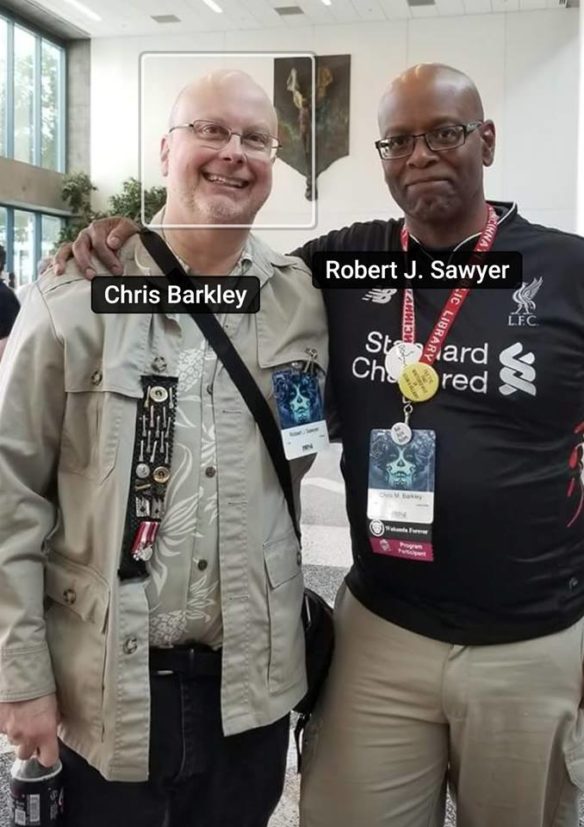 The Dealer’s Room opened at noon. Wandering through we spotted David Gerrold hawking books and tribbles. Juli and I jointly presented him with a of a pair socks, a joke tradition that began back when we saw him at Sasquan in 2015. This year, the socks we presented him with were emblazoned with the snarky saying “Adult In Training” which he seemed to like. We also purchased his vampire novel, Jacob and a tiger-striped tribble one for our granddaughter, Lily.
The Dealer’s Room opened at noon. Wandering through we spotted David Gerrold hawking books and tribbles. Juli and I jointly presented him with a of a pair socks, a joke tradition that began back when we saw him at Sasquan in 2015. This year, the socks we presented him with were emblazoned with the snarky saying “Adult In Training” which he seemed to like. We also purchased his vampire novel, Jacob and a tiger-striped tribble one for our granddaughter, Lily.
Steve Davidson, editor and publisher of the newly revived Amazing Stories, was receiving a respectable amount of traffic at his booth. I commended Steve for handing out a superb issue for free to attendees.
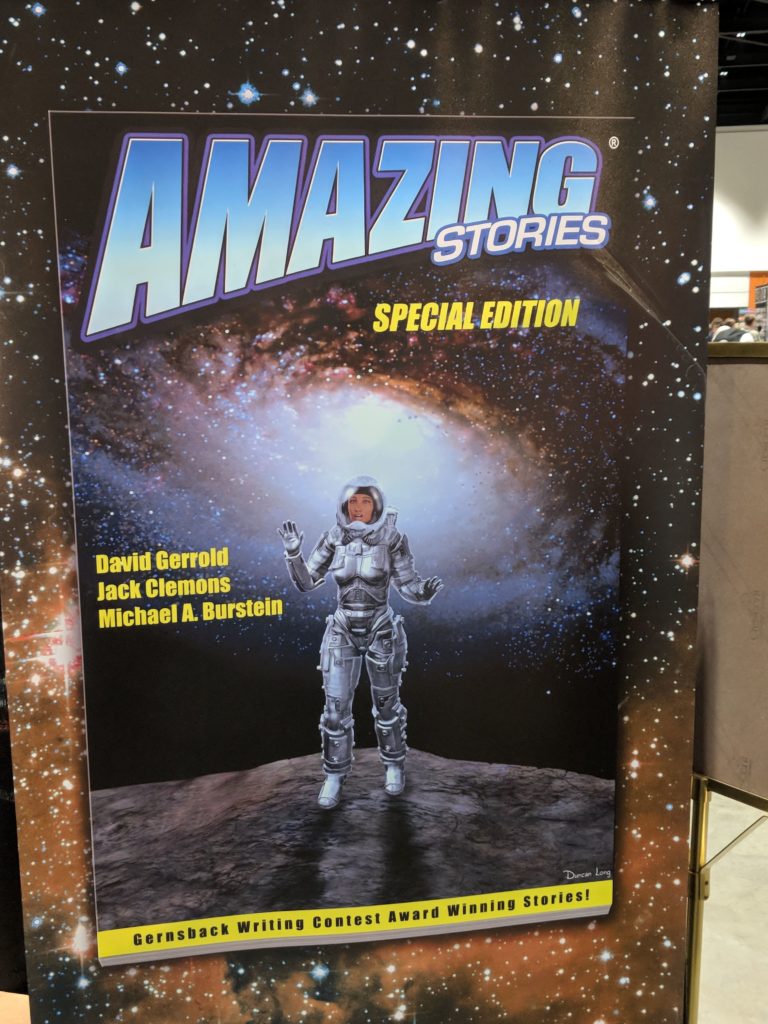
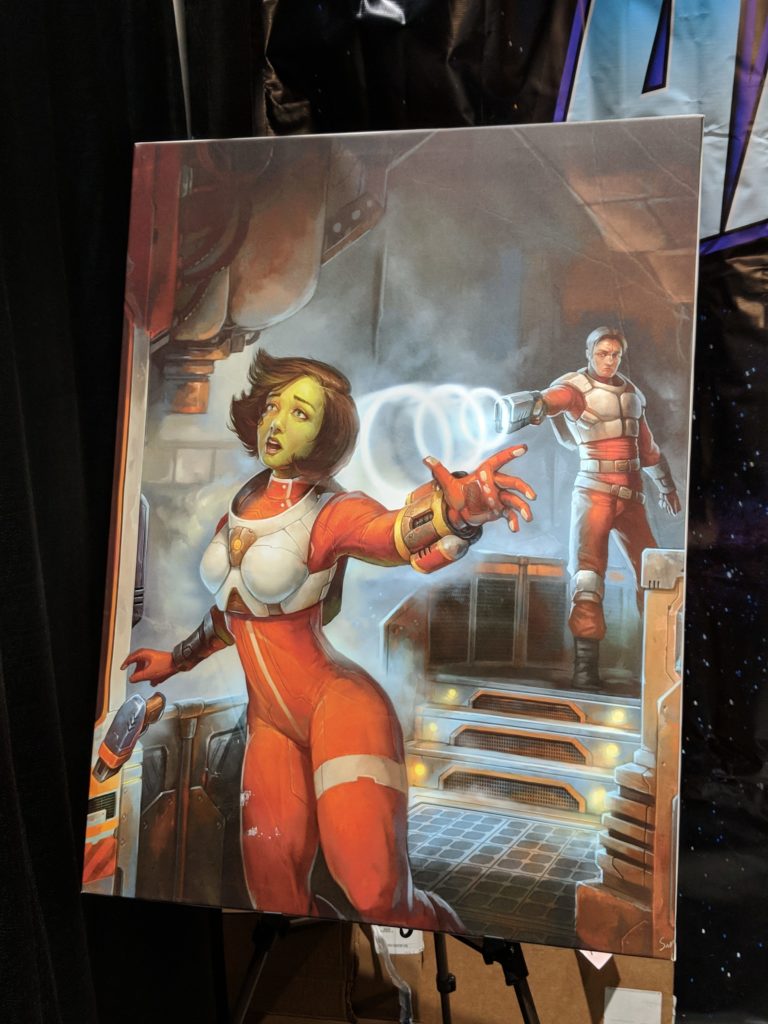 As the day progressed, I was approached by a number of friends and acquaintances who expressed their condolences and disappointment over the naming (or, rather, the non-naming) of the Young Adult Book Award. I thanked them all and said that I was happy that Worldcon was finally recognizing the works of young adult authors.
As the day progressed, I was approached by a number of friends and acquaintances who expressed their condolences and disappointment over the naming (or, rather, the non-naming) of the Young Adult Book Award. I thanked them all and said that I was happy that Worldcon was finally recognizing the works of young adult authors.
I had my first panel in the afternoon; “My First Worldcon” which also featured Cindy Lin (who did not appear), John Hertz (who was running late), and Edwin S. “Filthy Pierre” Strauss. Most of the audience, numbering about twenty people, had never been to a Worldcon before and for a few, THIS was their first convention. To those few I jokingly said, “Well, luckily for you, it’s all downhill from here,” which drew a hearty laugh.
But from that point on, Pierre and I gave out some basic explanations of the origins of Worldcon, what to expect and how to survive the next four-and-a-half days with their wits intact. Twenty minutes in, John Hertz, elegantly dressed as always even in the daytime, waltzed in and brought the proceedings a great deal more gravitas and more practical advice (hygiene, hydration and happiness basically) than Pierre and I had combined. I hope the audience left a little more informed about what Worldcon was all about and had a good time.
From there it was off to Opening Ceremonies, where we were greeted and regaled by a dozen or so members of the local Native American Muwekma Ohlone tribe, who shared several songs with us. Artist Guest of Honor and Hugo Toastmaster John Picacio introduced his fellow artists of the Mexicanx Initiative who were attending the Worldcon at his behest. By all accounts, they had a great time.
 One unusual thing; the First Fandom Award and the Big Heart Award were given out and I don’t recall them ever being presented separately and this early in the convention. I surmised (correctly, as it turned out) that John Picacio was planning to run the Hugo Awards VERY quickly. Erle M. Korshak, one of the last living members of the first World Science Fiction Convention in 1939 (Robert Madle being the other) presented Robert Silverberg with the First Fandom Hall of Fame Award. The late June and Len Moffatt were inducted into the Hall posthumously. My Editor, Mike Glyer, was announced as the surprise recipient of the Big Heart.
One unusual thing; the First Fandom Award and the Big Heart Award were given out and I don’t recall them ever being presented separately and this early in the convention. I surmised (correctly, as it turned out) that John Picacio was planning to run the Hugo Awards VERY quickly. Erle M. Korshak, one of the last living members of the first World Science Fiction Convention in 1939 (Robert Madle being the other) presented Robert Silverberg with the First Fandom Hall of Fame Award. The late June and Len Moffatt were inducted into the Hall posthumously. My Editor, Mike Glyer, was announced as the surprise recipient of the Big Heart.
Surprisingly, Mike was not present to accept so I promptly texted him: “Dude, YOU just won the Big Heart Award… CONGRATULATIONS!”
His reply, several hours later was: “Thanks Chris. If only someone had hinted, ‘Mike you shouldn’t miss Opening Ceremonies!’”
As I was checking my Facebook feed at dinner, I saw that Worldcon 76 had an uninvited guest earlier in the afternoon; Jon Del Arroz. His hostile and provocative statements towards Worldcon 76 and previously recorded intentions of disrupting the convention got him banned from attending. Streaming live and commenting as he walked, he filmed himself entering the convention center and tried to register. He was quickly spotted and asked, very politely by Worldcon security, to leave the building.
As Del Arroz was being led out, he repeatedly asked why he was being ousted, knowing full well why he was getting the boot. I only wished I had been there to witness his inglorious exit because as he passed by, I would have piped up and shouted, “You want to know why, Jon? Because you’re a JERK, that’s why!”
Juli and I dined out at a restaurant amusingly called Vietnom, which was situated in an amalgamation of other eateries called SoFA Market. The food was incredibly good and generously portioned. We also heartily recommended Tac-OH, a nice, casual Mexican place with a nice ambiance to our friends and anyone else who would listen to us.
Later in the evening, We did run into Pablo Miguel Alberto Vasquez, with whom we shared several overpriced drinks with at the Marriott bar before retiring.
As my head touched the pillow I remembered that a group of folks from File 770 were going to convene at a bar but completely forgot about it. I made a mental note to try and make the second meet up, which was going to be at another venue on Friday.
Friday, 17 August
The first full session of the Business Meeting was scheduled in the morning. And while I had no doubts about the outcome, I always go in with butterflies in my stomach. To feed those butterflies, Juli and I consulted the Restaurant Guide.
“Hey hon,” said Juli, “what about Peggy Sue’s?”
Something stirred in my memory. “Where is that on the map?”
“About two blocks away.”
Sixteen years ago at ConJose, I usually started my day at an amazing little diner that served amazing food with generous portions. We walked over several streets and easily found Peggy Sue’s on San Pedro Street; a quaint little diner with the sensibility and décor that was straight out of the 50’s and 60’s. The food, eggs, burgers burritos and shakes were the best I have ever tasted. We happily ate there on a regular basis during the rest of our stay.
Frankly, I dreaded going to the Business Meeting. I had no doubt that some there were feeling a certain measure of schadenfreude towards me in the wake of the withdrawal of the proposition to add Ursula K. Le Guin’s name from the Young Adult Book Award. And I did note that several regular attendees went out of their way not greet me or ignore my friendly overtures to make small talk.
There were a few old friends who did come up and either commiserate with my frustration or added the condolences over the situation.
Regular readers of File 770 know that I had been a longtime advocate of making this new award a Hugo Award category. But, after several years and series of study committees (the last of which I did not participate in due to family issues), it was decided that it would be better to have YA novels compete separately from other award categories. But I needn’t have worried about the Friday session; it finished in what seemed to be a record time of an hour and ten minutes without too much parliamentary rancor or shenanigans. Usually these sessions take up the full three hours of allotted time each day.
What would I have said? I would have read the following excerpts from her 1973 National Book Award acceptance speech for her children’s novel, The Farthest Shore, which can be found in her 1979 collection of essays, The Language of the Night:
“I am very pleased, very proud and very startled to accept the National Book Award in children’s literature for my novel The Farthest Shore…
“And I also rejoice in the privilege of sharing this honor, if I may, with my fellow writers, not only in the field of children’s books, but in that even less respectable field, science fiction. For I am not only a fantasist, but a science fiction writer, and odd though it may seem, I am proud to be both.
“We who hobnob with hobbits and tell tall tales about little green men are quite used to being dismissed as mere entertainers, or sternly disapproved of as escapists. But I think that perhaps the categories are changing, like the times. Sophisticated readers are accepting the fact that an improbable and unmanageable world is going to produce an improbable and hypothetical art.
“At this point, realism is perhaps the least adequate means of understanding or portraying the incredible realities of our existence. A scientist who creates a monster in the laboratory; a librarian in the library of Babel; a wizard unable to cast a spell; a spaceship having trouble reaching Alpha Centauri: all of these may be precise and profound metaphors of the human condition. Fantasists, whether they use the ancient archetypes of myth and legend or the younger ones of science and technology, may be talking as seriously as any sociologist – and a good deal more directly – about human life as it is lived, and as it might be lived, and as it ought to be lived. For after all, as great scientists have said and as all children know, it is above all by the imagination that we achieve perception, and compassion, and hope.”
Yes, even forty-five years ago, Ursula Le Guin UNDERSTOOD the power, grace and majesty of fantasy and science fiction in modern literature even if her mainstream contemporaries and literary critics refused to, then OR now.
But now, the best moment to permanently honor her, in this fashion, has passed. And so it goes.
After the Business Meeting, Juli and I made a beeline to the Dealers Room to decompress. One of our stops was at John Picacio’s table, where we marveled at his series of images inspired by his love of Loterria, a Mexican version of bingo.
We particularly liked El Arbo, La Valiente and La Luna, which we happily purchased on the spot. His image of La Calavera (The Skull) graced the cover of the Worldcon 76 Souvenir Book and the attendee’s badges.
Later that afternoon, Juli and I had the pleasure of playing Loteria (a delightful form of Mexican Bingo) with John and an enthusiastic crowd of several dozen people. We played with cards covered with mystic images, animals and symbols using uncooked beans as cover tokens. John was having a terrific time as our host, giving out prints, posters and cards of his work as prizes. Juli and I came within a space or two of winning but as frustrating as it was, we were having lots of fun and so was the everyone else.
We saw Robert Silverberg wandering in the Dealer’s Room and he said he was looking forward to Harlan’s memorial panel. He then cocked one of his bushy eyebrows at me and asked, “And what are YOU going to share about Harlan tomorrow?”
‘Oh, you’ll see, “ I said with the utmost confidence and a grin. HA! Yeah, I had NO IDEA what I was going to say right then. Then again, it’s never wise to let Robert Silverberg see you sweat.
For dinner, we joined Rick Moen and two full tables of File 770 fans and writers at Back A Yard Caribbean Grill, an excellent hangout with very good Jamaican fare. The Boss was not present but Juli and I were in excellent company.
We also made the rounds of the parties in the Fairmont Hotel. While we had a good time, we were still feeling a little jet lagged from the trip west so retired shortly before midnight.
Saturday August 18
I woke up and lay in bed with a mild case of apprehension.
The “Harlan Ellison Memorial” panel was scheduled at 4 p.m. and I had no idea of what I was going to say yet. I had left the notes I had made when I wrote my remembrance of him for my File 770 column at home.
Former Worldcon chair (and friend) Tom Whitmore was the moderator along with authors David Gerrold, Robert Silverberg, lawyer and photographer Christine Valada and Harlan’s biographer, Nat Segaloff.
And me.
I was a last-minute stand in for another close friend of Harlan’s, Adam-Troy Castro, who was unable to attend. I was pretty damn sure Adam had hundreds of Harlan stories and anecdotes that he could readily remember at a moment’s notice. What did I have?
Of all the people on the panel, Tom and I were the only fans. Realizing that, I knew exactly what I was going to say…
Saturday session came and went as quickly as the previous session. After the YA Award amendment had passed there was a pause in the meeting to provide some maintenance for the video equipment. A friend asked what i thought the YA Award should look like. “It should be a statue of Ursula Le Guin,” I said without the slightest hesitation and a small chuckle. No one knew what the award was going to look like but it was rumored that it was highly likely an engraved plaque would be presented. But I also heard from another well placed source before the convention that there was a surprise in the offing, too.
When Juli and I left the meeting, we determined that there was probably no reason to attend the Sunday session; a proposed amendment regarding the revision of the definitions of the Best Fan and Professional Artist categories had been pushed back to tomorrow’s agenda due to a meeting of the Association of Fantasy and Science Fiction Artists happening later today. ASFA members had read the proposals and wanted to debate their merits beforehand. Since neither I, nor Juli, had an opinion either way about the issue, we decided to skip it. In retrospect, I’ll wish we hadn’t.
After the Business Meeting, we decided to go on another buying expedition back at the Dealer’s room. It was there that Juli and I encountered our good friend Marcia Kelly Illingworth, who beckoned us to her table.
Marcia showed us a vast array of fannish keepsakes, artifacts and jewelry for sale, all the property of Samanda Jeude, the founder of Electrical Eggs. A survivor of a condition known as post-polio syndrome, she started Electrical Eggs in the 1980’s, first to assist physically challenged fans attend Worldcons, and then expanding to local and regional cons as well.
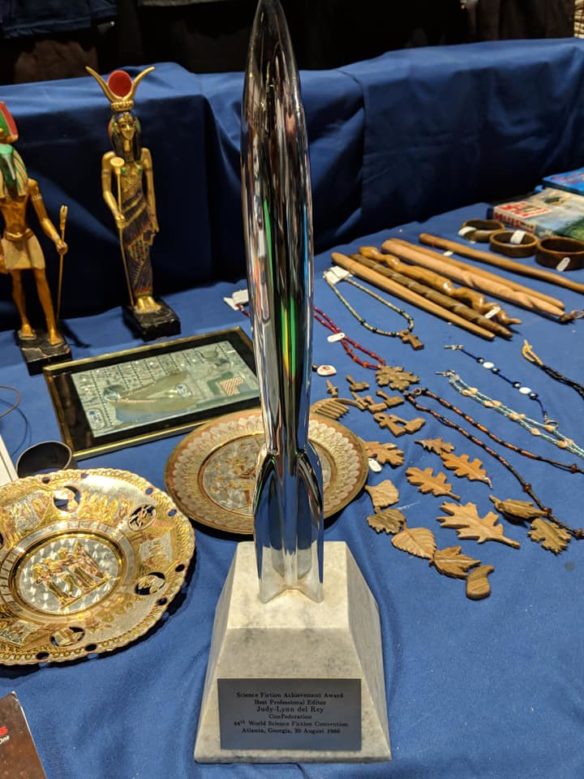
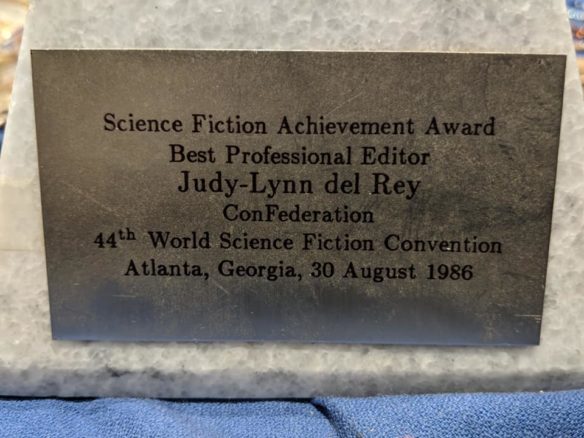 But an object along the back of the table immediately caught my eye, A Hugo Award mounted on a piece of glazed Georgia marble, I picked up and upon reading the engraved plaque, recognized it right away, Judy-Lynn Del Rey’s infamous posthumous Best Editor award from the 1986 Hugo Ceremony. Why do I say “infamous”? Well, Del Rey, a master book editor from all accounts, was so good at handling Ballantine Books fantasy and sf books, she was promoted to editor-in-chief and given their own imprint by Ballantine Books, with the assistance of her husband, Lester, who handled the fantasy line. Judy-Lynn Del Rey suffered a brain hemorrhage in October of 1985 and subsequently died in February of 1986. Fans who knew of her and her work were quick to nominate her in the Best Professional Editor category, which had been dominated by magazine editors since it’s modern incarnation in 1973.
But an object along the back of the table immediately caught my eye, A Hugo Award mounted on a piece of glazed Georgia marble, I picked up and upon reading the engraved plaque, recognized it right away, Judy-Lynn Del Rey’s infamous posthumous Best Editor award from the 1986 Hugo Ceremony. Why do I say “infamous”? Well, Del Rey, a master book editor from all accounts, was so good at handling Ballantine Books fantasy and sf books, she was promoted to editor-in-chief and given their own imprint by Ballantine Books, with the assistance of her husband, Lester, who handled the fantasy line. Judy-Lynn Del Rey suffered a brain hemorrhage in October of 1985 and subsequently died in February of 1986. Fans who knew of her and her work were quick to nominate her in the Best Professional Editor category, which had been dominated by magazine editors since it’s modern incarnation in 1973.
I was in attendance at Confederation when this award was given. Sitting in the audience, and knowing what a curmudgeon Lester Del Rey could be, I had a very bad feeling in the pit of my stomach as a representative approached the podium. He (whose name is lost to me and history), read a bitter and forceful statement from Lester Del Rey which more or less said that he was rejecting this award because she was dead and this was just a sympathetic gesture that he want no part of whatsoever. The audience sat there, stunned. The representative left the stage empty-handed. The Hugo Award was taken away, its fate unknown to everyone there.
I felt awed as I held it in my hands. Samanda Jeude and her late husband, Don Cook, members of the Confederation convention committee, were given custody of the Hugo for safekeeping. Marcia explained that Samanda was now in an assisted living facility but needed money to help pay her bills. She also said, emphatically, that this particular Hugo award was NOT for sale; but said that there were competing fund drives being held at Worldcon 76 to determine its fate. We could contribute to one fund to put it up for sale to the highest bidder or the other to make sure it stayed out of the hands of a collector. I pulled out a $20 bill and voted for the latter fund. It belongs in a museum as a noted fictional archeologist one stated. (At the end of the convention, Marcia Kelly Illingworth posted on Facebook that the fans had spoken and the Hugo will be eventually donated to an institution for posterity.)
I also spotted an Incident Response Team desk in a prominent spot in the fan activities area with two staff members at the ready. It was nice to know they were there and on duty.
At around 1 p.m., I decided to take a look outside the north entrance of the convention center. Jon Del Arroz, in his infinite wisdom, had called on like-minded right-wing fans to come and protest hedonism, liberal bias and “pedophilia” of the attendees several weeks earlier. (Which makes his effort to try and register on Thursday appeared to be a rather lame attempt to rile up his supporters.) The call also attracted the attention of Trump supporters and white supremacists, who promised to show up in force. That, in turn, inflamed local antifa members, who promised to be there to counter-protest.
Well, I went to the main entrance, which the committee had forewarned us not to use during the time period of the protest, from noon until four pm. As I descended the stairs, I saw a rather pudgy man trying to enter the front door which was blocked by a police officer and a staff person. I surmised that he was being denied entry because of the sign he was carrying, which said in huge, capitalized block letters: “DEL ARROZ DID NOTHING WRONG.” Oh well, no one said his supporters were smart. I do wish I had taken a picture of that scene, though.
Peering out onto the plaza, I did not see much of anything going on. In fact, it looked as though there were more police officers on the scene than protestors. The official estimate was a total of forty people showed up, evenly divided for each side. The local news coverage bore this out.
The charge of pedophilia against Walter Breen, and by association his wife Marion Zimmer Bradley, are quite real and happened decades ago. Bringing Samuel R. Delany into the discussion is just pure slander. The only thing he might be guilty of is writing “transgressive literature” which some critics and readers must have mistaken for pedophile porn.
I did notice that there were about a dozen people in pink shirts emblazoned with “ I’m Here To Help” acting as escorts for people coming to or leaving the convention. It was a lovely gesture which I am sure people appreciated.
Fifteen minutes before the Ellison panel, I made my way to the Green Room for a drink. As I passed through the lobby, I saw my boss, Mike Glyer, seated at a table with his back to me, holding court with a group of friends. If I hadn’t been en route to my panel, I would have stopped and said hello. In light of what happened the next morning, I really feel badly about that.
As I walked into the Green Room I bumped into my fellow panelist Nat Segaloff, whom I recognized by his Facebook profile picture. And he was there for the same reason I was. After grabbing our beverages of choice, we made our way to Room 210G…
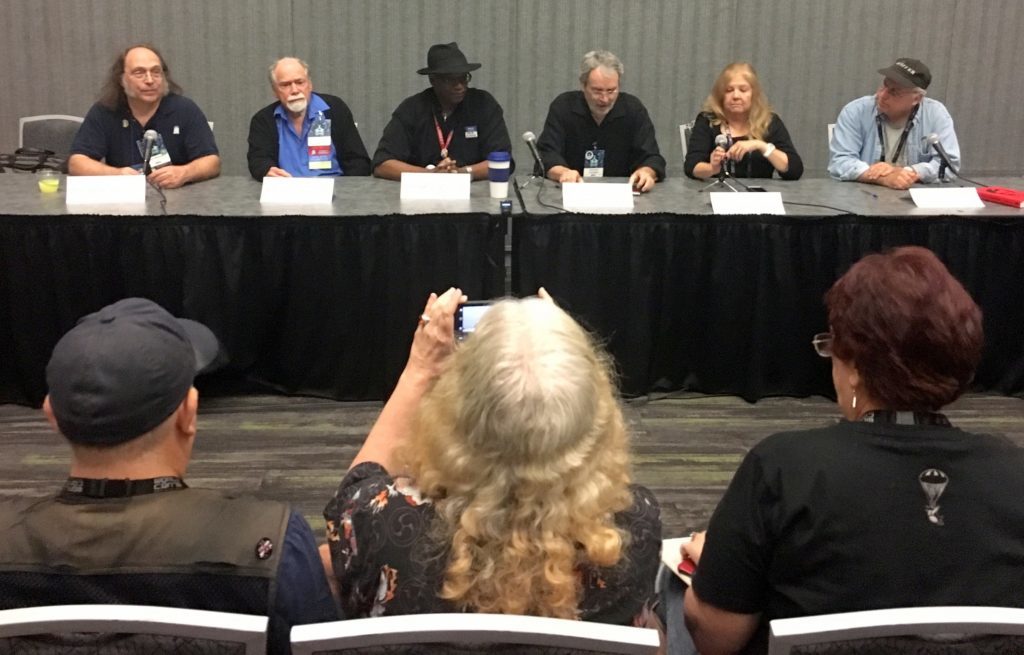
Panelists: Tom Whitmore, Bob Silverberg, Chris Barkley, David Gerrold, Christine Valada, and Nat Segaloff.
And here I must fault the Programming Division on their choice of venue( although it is difficult to predict a panels popularity), which was significantly too small to accommodate the crowd, standing room only; and the time allotted, which was at the very least thirty or forty-five minutes too short. Luckily, Juli got a seat in the back as Nat and I arrived. All of the other panelists were already there except for our moderator Tom Whitmore. I took the third seat from the left, Robert Silverberg on my right, then David Gerrold, Christine Valada and Nat at the very end of the table. I gave David a hug as he sat but he then leaped up and said, “I forgot my recording mikes. Don’t start without me!”, and he ran from the room.
While David was gone, I took the opportunity to show Christine two items I have on my everyday keychain that I keep in remembrance of her late husband, Len Wein; a very small Batman symbol and a metal tag from the Wolverine work shoes. Len did me a big favor by being a guest on my public access sf radio show back in 1983 (as a counterpoint to another interview guest, Marvel’s editor-in-chief Jim Shooter). I think I may have shown them to Len at a Worldcon years earlier and he got a good laugh out of it. Christine hadn’t seen them and was very appreciative of the gesture.
David came running in with his microphones just as Tom had seated himself at the table. As soon as David had situated himself, Tom opened the proceedings.
So, as the fan representative on the panel, I reached back into my childhood memories and said that I knew of Harlan’s work on television even before I had the pleasure of knowing him. I eschewed more sophisticated stuff like Burke’s Law and The Man From U.N.C.L.E. for more works of primal fear like The Outer Limits. I noted my reactions to “Soldier” and “Demon With a Glass Hand” but I also could have included “The Price of Doom” a first-season episode of Voyage to the Bottom of the Sea which was disowned by Harlan under his pseudonym “Cord Wainer Bird” (for the VERY first time, by the way), a nightmare story about a strain of mutant plankton taking over the Seaview.
While I was feeling at ease, I was very worried about David, who was opening shedding tears next to me. But when his turn came to speak, he pulled it together and told memorable stories of how they met, how Harlan inspired him as a writer and most poignantly, helped saved his life by listening and reassuring him during a particularly dark period in his life.
As you can tell from the audio recording there were many stories and anecdotes about Harlan, many of them much better than my own, in my estimation. I wished we had more time to take questions and hear memories from the standing room only crowd but it was not to be. When Robert Silverberg capped things with his eloquent quip, we all rose to a big round of applause. I gave David a hug and a kiss. Mr. Silverberg signed my copy of the special 1977 Harlan Ellison issue of the Magazine of Fantasy and Science Fiction I had brought with me and featured a short biographical memory written by him.
After the panel we discovered that Jon Del Arroz had not even bothered to show up at his own protest. In a video on Twitter shot on a boat at sea (not his own, it appeared) he explained that the air quality in downtown San Jose was unsuitable for his young son (WHAT? He was planning to bring his own SON into a potentially dangerous situation?) and begged off attending. Well, isn’t it nice to know that if ANYTHING had gone screwy, America’s Leading Conservative Hispanic author would have been safely out of harm’s way to protest (and annoy us) some other day.
We dined at Tac-Oh, a very nice restaurant located just around the corner from the convention center. While the ambiance and food was great, we and a dozen other patrons were put off because there was only one waiter on duty taking everyone’s orders.
When we inquired why, the waiter told us that the management was NEVER informed about a convention being in town this weekend. Since the wait schedule was made out in advance, once the management found out about Worldcon 76 they found that their most of their staff was unavailable.
Now, this was not the first time that we had heard this during our stay. I don’t know who might be at fault here but somebody, at the visitors and convention bureau or the convention committee or some third-party in between really dropped the ball on this issue. And its little irritants like this that can really stick in the minds of attending fans. Future convention committees and bids should make a bullet point note of this.
From there we traveled back to the convention center for the Masquerade, hosted by Christopher Garcia. While the presentation was plagued by what seemed to be an endless series of technical faux pas and delays, Chris gamely plowed forward as the master of ceremonies, improvising with self-deprecating humor and scattershot jokes all during the show.
Shortly after the Masquerade started there was a surprising presentation; the Seiun Awards, which had a longstanding relationship with the Hugo Awards Ceremony, began without any prior announcement from the convention. (I checked the Pocket Program Book later and there was no notice there either.)
As egregious as Programming’s mishandling of the Ellison Memorial panel was, I felt that this was far worse. The Seiun is a highly respected award and had been, to the best of my knowledge, a part of the Hugo Awards Ceremony for a considerable period of time. While I recognize that the Hugo Ceremony has been getting longer in recent years, the relegation of the Seiun Awards to the beginning of the Masquerade seemed either haphazard or, even worse, a slight to those were presenting their awards. If the length of the Hugo ceremony was the problem, then the Seiuns should have been presented at the Opening Ceremonies or in their own hour-long panel and ceremony. I don’t know how everyone else felt about this but It felt awkward that Worldcon 76 had literally put the Seiuns in a corner instead of a deserving and proper setting.
The costuming presentations resumed and when they were over, we did not hangout for the halftime entertainment or the judges’ decisions. Instead, we headed back over to the Fairmount for another round of noisy and exuberant room parties before retiring back to our room for a good night’s sleep.
Sunday, 19 August
The morning was spent in the company of Juli’s sister Gail, her husband Mauro and their kids Sonia and her younger brother, Dario. We met at Peggy Sue’s and feasted on a mountain of omelets, breakfast sandwiches and pancakes. Juli and I regaled them with our convention adventures and name-dropping the famous writers and creators that we met that week. We heard from both parents that later that morning, Dario and Sonia vehemently argued over which of us was cooler. Heh!
Meanwhile, as the Business Meeting was concluding its Sunday session, there was a motion from the floor to ask the Officers of BM to send a note of condolences to the family of Ursula Le Guin for the upsetting circumstances behind the naming of the Young Adult Award. I found out about the proposed apology and the vote on the matter after the fact several hours later after Juli read a condensed version off of a report on a blog by a mutual friend, Alex Von Thorn. When I read it, I was furious.
I had spent a great deal of time and political effort in creating the YA Award and attaching Ms. Le Guin’s name to it. And now the very people who opposed her name wanted to apologize?
What the actual HELL?
And then we heard from friends in the Dealer’s Room that Mike Glyer had been overcome with some serious ailment earlier in the morning and been taken to a hospital nearby. I immediately texted Mike on my phone through Facebook wishing him well and offered to be a designated acceptor in case he won the Hugo. (I needn’t have worried; he called in Jo Van Ekeren to accept in his stead.)
Since there was nothing to be done about it at the moment, Juli and I split up to attend two separate program items. She went to Celebrating the New Award Category (a panel I avoided for obvious reasons) which featured Anna Blumstein, Sam J. Miller, Sarah Rees Brennan and Ursula Vernon. I attended Black Panther, Luke Cage and the #Ownvoices Creators with Steven Barnes, Sumiko Saulson, Leslie Light and T.L. Alexandra Volk. Juli found her panel a fine opportunity for YA authors to speak to other YA enthusiasts (it was well attended) and was mainly focused on its popularity and where it might be going next. My panel was just fantastic; all of the participants were engaging, excited, serious and funny. About twenty percent of the audience was made up of people of color but everyone in attendance was listening raptly to the conversation about race, sexism, appropriation and the current political and socio-economic conditions in art and fandom today.
After a delicious early dinner at La Victoria Tacqueria, we returned to our hotel to dress up for the Hugos. Juli donned a lovely black satin dress with a white bow in the back. I wore a blue suit with a black shirt, orange tie and and florid blue, white and orange FC Cincinnati scarf around my neck.
When I describe the 2018 Hugo Ceremony as a whirlwind affair, it is not an exaggeration. Clocking in at a little over two hours, it is handily one of the fastest on record. Artist Guest of Honor John Picacio had pledged as much when he was named as the Master of Ceremonies. And, as promised, he delivered the goods. (And displacing the other non-Hugo Awards helped as well.)
As each award was announced, I took multiple screenshots of the video boards showing the nominees and the winners on my phone and posted them immediately to my Facebook page. Several people later reported that they appreciated finding out the winners in real-time.
I was very happy that the boss, Mike Glyer, won the Hugo for Best Fanzine. And as Ms. Van Ekeren accepted for him, it was incredibly classy of him to remove File 770 from future consideration. Mike, as it was later reported, was laid up with an irregular heartbeat that would require the insertion of a pacemaker, so the Hugo was a pick-me-up. Also, Mike had Ms. Van Ekeren mention me by name in his speech, which had me a little chuffed as well.
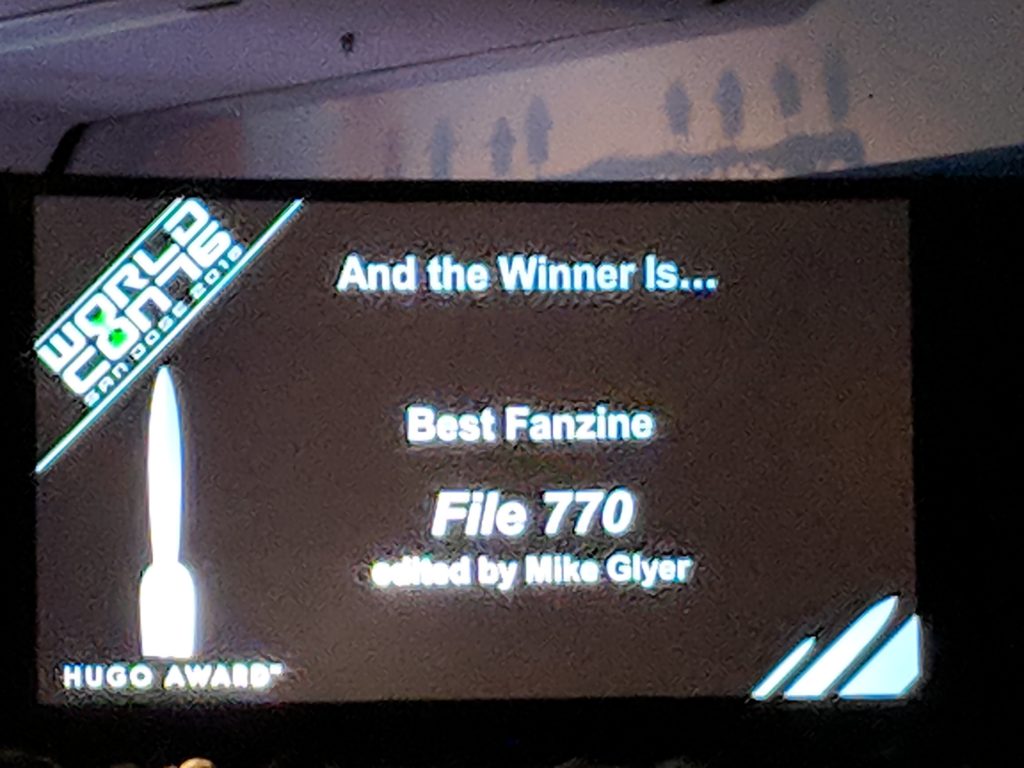 The Best Related Work was won by Le Guin’s collection of essays, No Time To Spare: Thinking About What Matters. I kept thinking how tremendous it would have been to have her name on future issuances of the YA Award and winning her final Hugo in the same evening.
The Best Related Work was won by Le Guin’s collection of essays, No Time To Spare: Thinking About What Matters. I kept thinking how tremendous it would have been to have her name on future issuances of the YA Award and winning her final Hugo in the same evening.
I was quite sure Best Dramatic Presentation – Short Form Hugo was going to go to the Black Mirror episode “USS Callister”, a wicked send-up of Star Trek, The Twilight Zone and gaming fandom. Instead, it went to one of the The Good Place’s best episodes, “The Trolley Problem”. I was similarly surprised by Wonder Woman’s win in the Long Form category; the list of nominees was one of the best in recent memory, especially with Academy Award winners Get Out and The Shape of Water in the mix. Get Out ended up finishing a distant second and The Shape of Water (which won the Oscar for Best Picture) was fifth.
Rebecca Roanhorse was also a double winner; she was the winner of John W. Campbell Award for Best New Writer AND in the Best Short Story category for “Welcome to Your Authentic Indian ExperienceTM”, a tale that penetrates and shatters perceptions of cultural appropriation.
I was delighted that Suzanne Palmer’s “The Secret Life of Bots”, a comic story of interstellar war taken from a maintenance bot’s point of view, won Best Novelette. It was my first choice that category and would make a great film for Pixar. Hint, hint.
As much as I admired Sarah Gailey’s alternate history adventure, “River of Teeth”, Martha Wells novella “All Systems Red” (which also won the Nebula Award) was my first choice here as well. I would not be surprised if HBO or some streaming service comes knocking on her door for “Murderbot” stories, sometime soon.
Felicia Day’s appearance as the presenter of the YA Book Award took everyone by surprise. And I could not be any happier that Nnedi Okorafor’s Akata Warrior was named the initial recipient of the Best Young Adult Book.
In fact, she actually received two awards; a plaque from the convention AND a trophy commissioned by Toastmaster John Picacio and designed and built by Sara Felix. If you were wondering how she accomplished this feat, here’s a link:
I hope that Ms. Okorafor’s book will be the first of many inspiring books that will win this special award in the years to come.
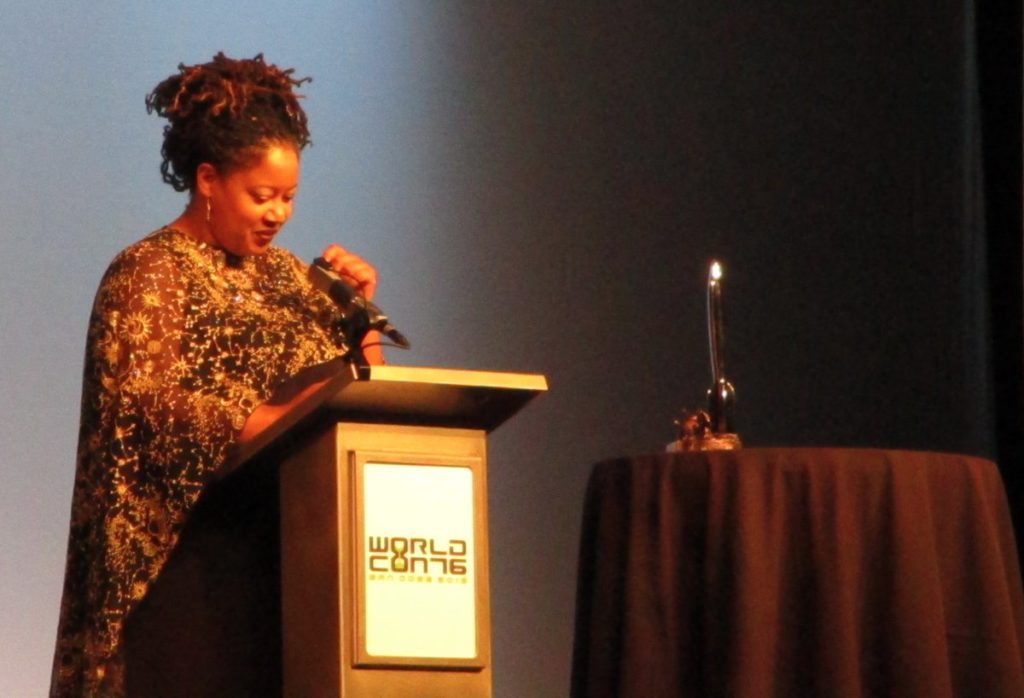 The Best Novel winner, N.K. Jemisin’s The Stone Sky was the odds-on winner since it was first published last year and I was not surprised that she prevailed. Juli, myself and the entire audience rose to its feet to applaud the first writer in history to win three consecutive Hugo Awards in the Novel category.
The Best Novel winner, N.K. Jemisin’s The Stone Sky was the odds-on winner since it was first published last year and I was not surprised that she prevailed. Juli, myself and the entire audience rose to its feet to applaud the first writer in history to win three consecutive Hugo Awards in the Novel category.
And the speech she gave was fearless, ecstatic, wonderful and electrifying:
And it was over. I wandered close enough to the stage to take a few photos, congratulate John Picacio for his hosting skills and, for a few brief moments, hold Mike Glyer’s Best Fanzine Hugo.
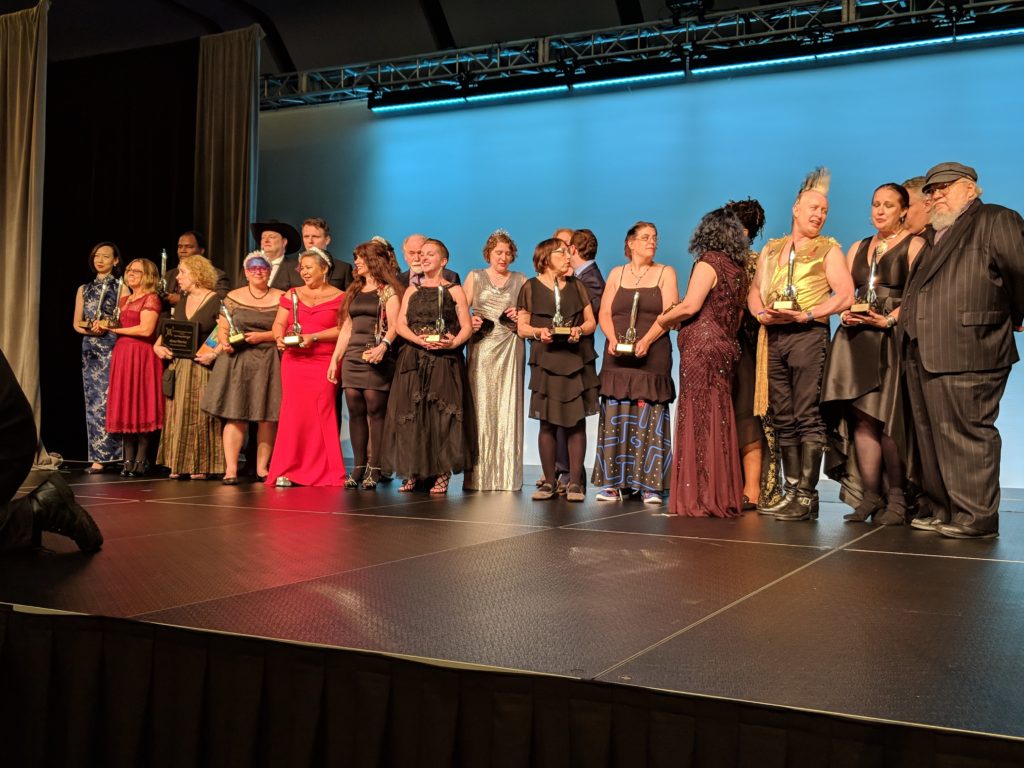 Not having an invite to George R.R. Martin’s Hugo Loser’s Party, we made our way to the Marriott’s overpriced bar to toast the winners. We met up with a friend and fellow Cincinnati Fantasy Group member, Joel Zakem and we properly indulged with hard cider and beer. New England fan Crystal Huff and her friends also wandered in and ended up seated next to us and we engaged in some fannish gossip for a while.
Not having an invite to George R.R. Martin’s Hugo Loser’s Party, we made our way to the Marriott’s overpriced bar to toast the winners. We met up with a friend and fellow Cincinnati Fantasy Group member, Joel Zakem and we properly indulged with hard cider and beer. New England fan Crystal Huff and her friends also wandered in and ended up seated next to us and we engaged in some fannish gossip for a while.
When we discovered that Joel’s flight was leaving at the very same time as ours, 1:10 pm, we made plans to share an Uber to the airport.
Monday, August 20
We arose before 8 a.m. and hit the ground running. I went to a nearby post office and brought back several priority mail boxes to ship back the books we purchased and had gotten signed. It was well worth the effort because we had JUST made it a pound and a half under the weight limit for our single, huge suitcase.
On the way back to the hotel, I passed by the windows of the Westin Hotel’s restaurant and stopped to make funny faces at several diners; con-runners Jim and Laurie Mann, John Lorentz and his partner Kathy, author Jo Walton and her breakfast companion and two Pittsburgh area friends, Bob and Carla Dundes.
We met Joel on the curb outside the Westin at around 11 a.m. and before long the Uber driver was taking us to the airport. I longed to make one more trip to the Dealers Room, say goodbye to friend and attend the Closing Ceremonies. But unfortunately, our early flight and the long layover in Salt Lake City would get us into the Greater Cincinnati Airport around midnight. Poor Joel had a longer haul; his flight was routed through Atlanta and he would be getting back to Louisville, Kentucky at an even more ungodly hour than us.
We were not the only ones making an early getaway; as we made our way through our terminal, we spied authors Nancy Kress (sporting a stylish black cast on her right foot from a mishap) and Jack Skillingstead waiting near a Starbucks for their flight.
Out two flights home were long and uneventful. Luckily, the last leg was a half an hour early and we were safely snug in our beds and surrounded by grumpy cats by 12:30 am. Jet lag be damned, we were asleep in ten minutes.
Discover more from File 770
Subscribe to get the latest posts to your email.

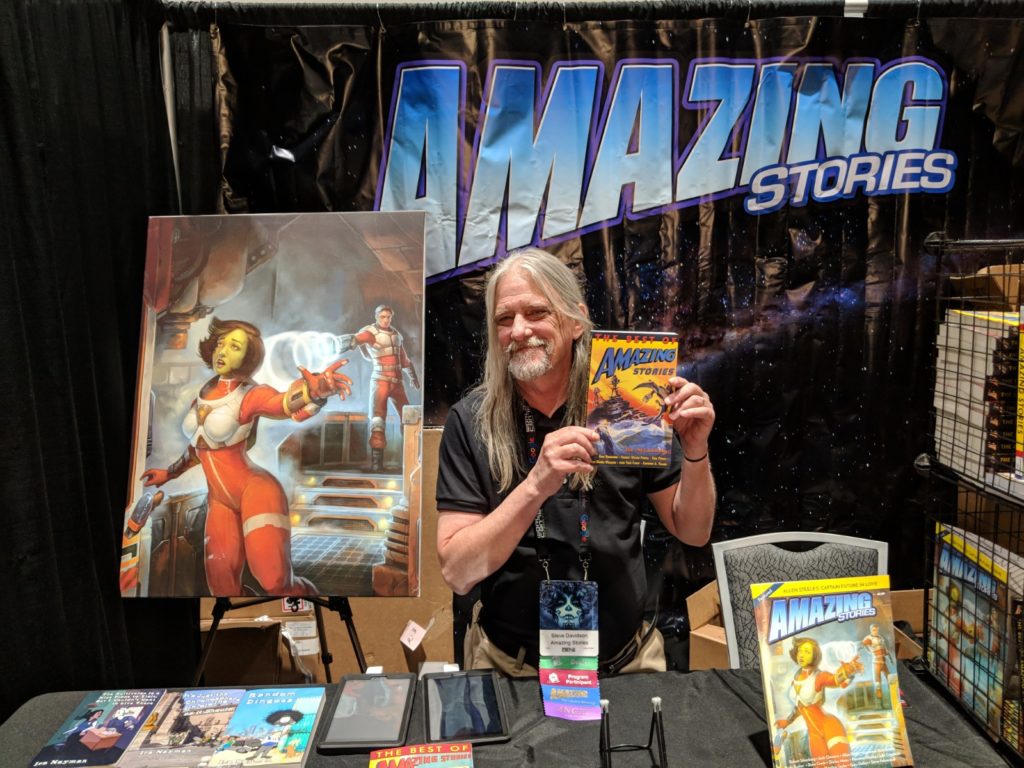



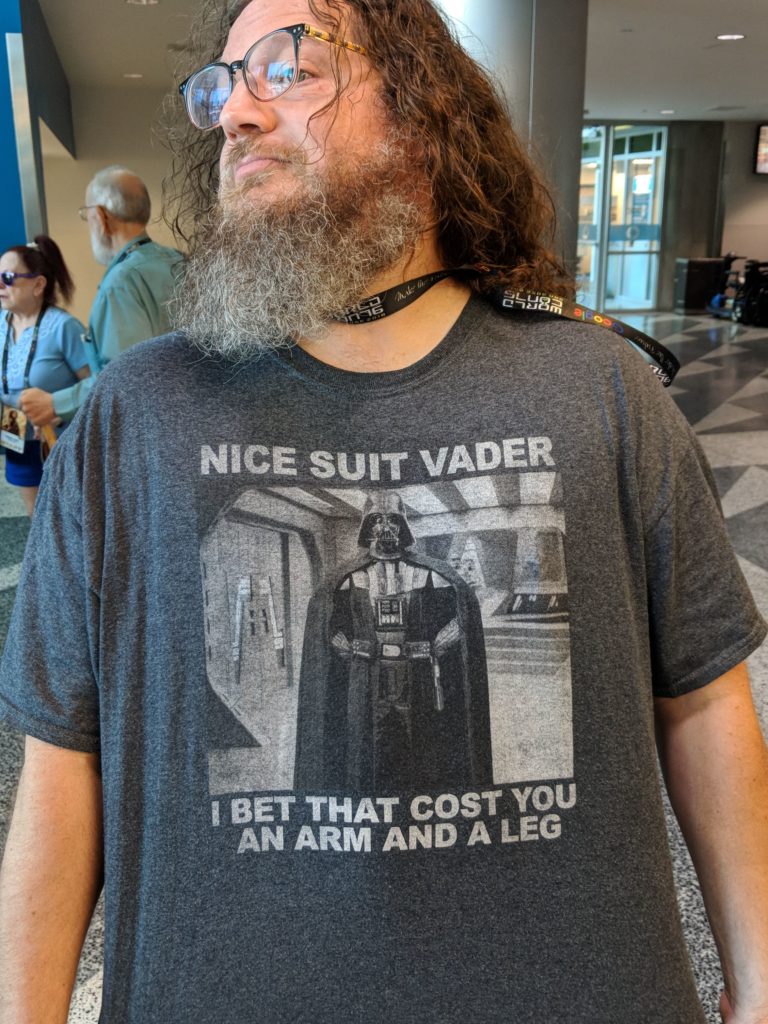
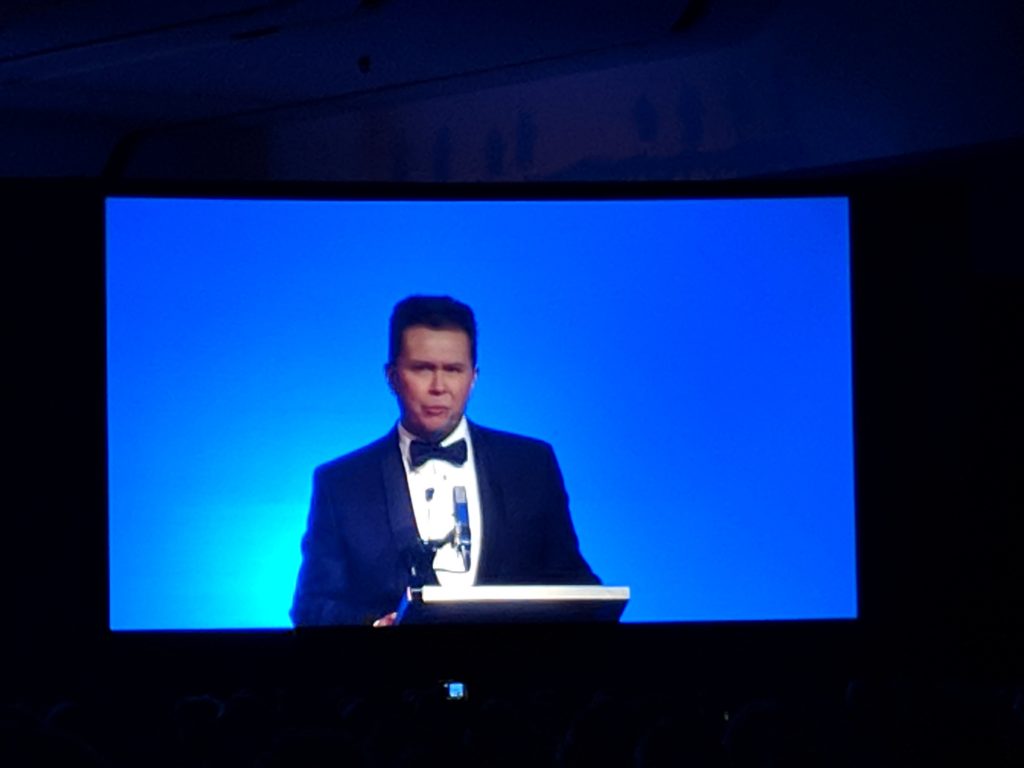
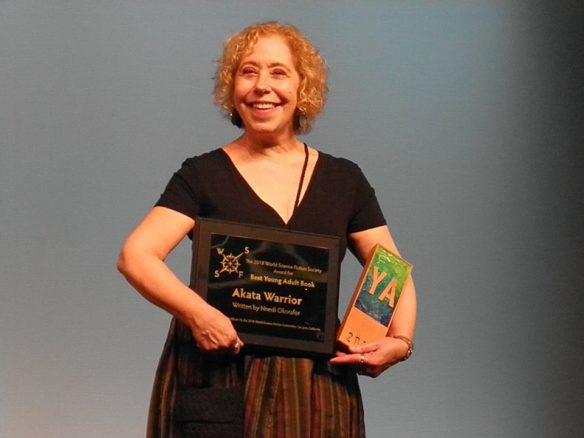
It is clear that the Japanese are perfectly happy for the Seiun award to be taken out of the Hugo ceremony and announced separately, because that’s exactly how they arranged things when the Worlddon was held in Japan in 2007.
Let it go.
OK, I’m [pissed. As the person spearheading the Restaurant Guide, I called every restaurant in the paper version (those being the closest to the convention center) to ask about advertising and to let them know about the convention. I called Tac-Oh three times in search of a manager or owner, and each time left a detailed message about the convention including dates and an estimated attendance number. I never heard back from them.
I glad that you found cool places to eat through the guide.
At Nippon 2007 did they only announce the overseas Seiun winners, which is what happens at other Worldcons, or did they announce ALL the Seiun winners, which obviously would be a quite different proposition.
I suspect that you meant someone else, since Ruth and I never ate at the Westin during the Worldcon….
In the interest of historical accuracy , it should be noted that, at the Marriott’s bar, I eschewed my usual beer (I wasn’t crazy about the selection) for a Bulleit Rye Manhattan (which seemed to take forever to arrive).
Regarding getting OGH to the Opening Ceremony: as I understand it, there was an attempt made to get Mike there, but was presumably not strongly worded enough to make it happen, which is a pity.
And it has not always been part of the Hugo Awards Ceremony. If you look at recent ceremonies, you’ll find that there it sometimes is there, and sometimes is not, presumably based on how the individual convention’s management and the ceremony directors felt about it.
And the meeting rejected the motion 23-31, with the strongest debate factor IMO being that the Business Meeting is not responsible for actions taken by individual WSFS members acting on their own, and that trying to take any official action would say that the the meeting was responsible. In fact, I wish there had been sufficient votes to suspend the rules and postpone the motion indefinitely, as I think it’s a good example of a case where it would have been better to neither pass nor reject the motion, but simply refuse to vote on it directly at all. (I admit to not thinking about moving so at the time, but by the final vote it’s likely that there wouldn’t have been sufficient votes to do the suspend/postpone think anyway.)
But this does IMO show why it’s generally a bad idea to let anything be introduced without having made the agenda deadline, unless there is at least a two-thirds majority who wants to consider it. Almost nothing other than certain courtesy motions like “to adjourn in memory of” is likely to be a good idea, and anything contentious is likely to be seen by some as an attempt to “ambush” the meeting by squeezing something in after most people have left because they figure nothing substantive is left to discuss.
Further to Kevin Standlee’s last paragraph, I had a hard time voting on the measure specifically because after a couple rounds of revision I wasn’t 100% sure what exactly we were voting on, even with the resolution being restated immediately prior to the vote.
It continues to deeply fascinate me – in the sense that watching a catastrophic train wreck is “fascinating” – how utterly oblivious you are to just how extremely bad your own words in these posts of yours make you look.
Chris Barkley: as the Business Meeting was concluding its Sunday session, there was a motion from the floor to ask the Officers of BM to send a note of condolences to the family of Ursula Le Guin for the upsetting circumstances behind the naming of the Young Adult Award. I found out about the proposed apology and the vote on the matter after the fact several hours later… I was furious. I had spent a great deal of time and political effort in creating the YA Award and attaching Ms. Le Guin’s name to it. And now the very people who opposed her name wanted to apologize? What the actual HELL?
As the proposer of this motion has pointed out in at least two other venues where you’ve posted this falsehood, it was not a proposal for an apology. It was a proposal to send a statement of WSFS’ esteem to them, after you had made WSFS look awful due to your inappropriate behavior toward the Le Guin estate and the YA Award.
You have a serious, longstanding problem of misrepresenting things that other people say. Once may be an accident. Twice may even be overlooked. But you’ve done it repeatedly, over a long period of time, with things said by several different people, which indicates that these are not “accidental” occurrences. Misrepresenting what other people say is a habitual problem with you, and you need to STOP doing it.
I can’t speak for the proposer’s motivations, but it looked to me as though they had come to the same conclusion I had come to: that you are never going to accept responsibility for your bad behavior in your attempts to hijack the carefully-considered naming of the YA Award as proposed by the members of the committee and approved by the WSFS members.
You are never going to make the apologies you owe to the YA Award Committee Members, the WSFS members, and the Le Guin estate for the incredible disrespect you’ve shown them – and are still showing them – over your ill-conceived, high-handed insistence on attempting to hijack the naming of an award. You are never going to apologize for your egregious presumption in contacting the Le Guin estate on WSFS’ behalf without any consultation with WSFS members, or their permission to do so, or for refusing to back down last March after WSFS members made it quite clear that this attempt was inappropriate and should be dropped.
The proposal was a well-intended attempt to compensate with a statement of esteem from WSFS members for the much-needed apology from you that the Le Guin estate will never receive.
Chris Barkley: I had spent a great deal of time and political effort in creating the YA Award
You did not create the WSFS YA Award. And you need to stop claiming that you did.
While you were indeed an early advocate of WSFS giving an award for YA speculative fiction, it is well known in WSFS circles that one of the reasons it took so many years for the YA Award to come into existence was your obstructionism in insisting that the award be designed in exactly the way you demanded.
Just so you know, and my hope in saying this is that it might, just might, cause you to pause and engage in some self-reflection: my understanding from other WSFS members is that, between your obstructionism on the YA Award, and your attempts this year to hijack the naming of it to suit your own personal agenda, your name appearing as the co-sponsor of a WSFS amendment proposal right now — any proposal — is tantamount to the Kiss of Death for it.
That is the amount of damage you have done to your reputation and credibility with your incredibly arrogant, disrespectful actions this year. That is the amount of damage you continue to do, every time you write one of these petulant, childish posts whining about the fact that WSFS members have rightly smacked down your selfish, misguided attempts to hijack the YA Award.
As Doire says, “Let it go”. If you were smart, you would pull your head in, and take a low profile in WSFS for a few years, in the hope that a lot of the members will eventually either forgive or forget your horrendous behavior this year.
But I’m not willing to take any bet that this will happen. And that makes me really sad. 😐
@JJ previously I wondered if Barkley had wandered astray in his enthusiasm regarding the YA Award issue. Witnessing this new episode and reading his flagrantly wrong-headed statement about what transpired at the Business Meeting makes me regret having giving him the benefit of the doubt. This more than some misunderstanding going on here. So, to JJ, I apologize having assumed the Barkley was not acting with bad intentions in the past. You were right!
As for Chris, man you really lost me. That hole you are digging can’t get much deeper.
Typos: Filthy’s first name is Erwin, and Harlan’s pseudonym begins with Cordwainer.
No. According to IMDB, the Voyage to the Bottom of the Sea episode Chris is talking about is credited to “Cord Wainer Bird” as stated. You should look it up like I did. (I didn’t think it was right, either.)
Because I don’t trust IMDB to be accurate, I found the episode in question at http://www.youtube.com/watch?v=Jfyfztv_45w; the “Cord Wainer Bird” credit is at 7:20. Surprised me, too. Could it be because Cordwainer Smith was still an active byline in 1964? That is, did Ellison switch to the one-word form after 1966?
Pingback: Cool Things That Happened On My Summer Vacation - Amazing Stories
The next Cordwainer Bird credit is 1968 (The Flying Nun). Whether Harlan changed the way he did it or the first time the studio just credited it wrongly, no way to know.
Yes, I think we’re all aware that Harlan virtually always wrote it “Cordwainer Bird.”
Possibly I should have argued with the grammar, not the spelling.
Is there any case in which Harlan himself wrote it otherwise, or that the 3-word version was used elsewhere? It’s unclear why he would have changed; I’m more inclined to believe a screwup in production.
Certainly that’s much more likely than you could have been wrong.
““The Price of Doom” a first-season episode of Voyage to the Bottom of the Sea which was disowned by Harlan under his pseudonym “Cord Wainer Bird” (for the VERY first time, by the way),”
Not the first time — there’s a letter signed by that name in the Spring 1957 issue of “Future Science Fiction“, and the Aug 1957 issue of “Super Science Fiction” has a piece titled “Invasion Footnote” by Cordwainer Bird (some sources say “Cortwainer”). A couple of 1963 issues of the skin mag “Adam” have pieces by Cordwainer Bird.
So this may just be the first time he used in on a script.
The first episode of “Burke’s Law” that Ellison wrote, entitled “Who Killed Alex Debbs?” had a character played by Sammy Davis Jr named “Cordwainer Bird”.
Pingback: AMAZING NEWS FROM FANDOM: September 30th 2018 - Amazing Stories
What JJ said. Give it a rest and try repairing some bridges instead of continuing to burn them. Like you did in this self-aggrandizing post.
@OGH: looks like it was a screwup….
To my critics, this all I have to say:
https://youtu.be/5RAQXg0IdfI
Chris B.
That certainly makes you look like a mature, self reflective person who actually considers the impact of his actions on a group he ostensibly cares about .
Lenora Rose: That certainly makes you look like a mature, self reflective person who actually considers the impact of his actions on a group he ostensibly cares about.
The adage “opening one’s mouth and removing all doubt” comes to mind. 😐